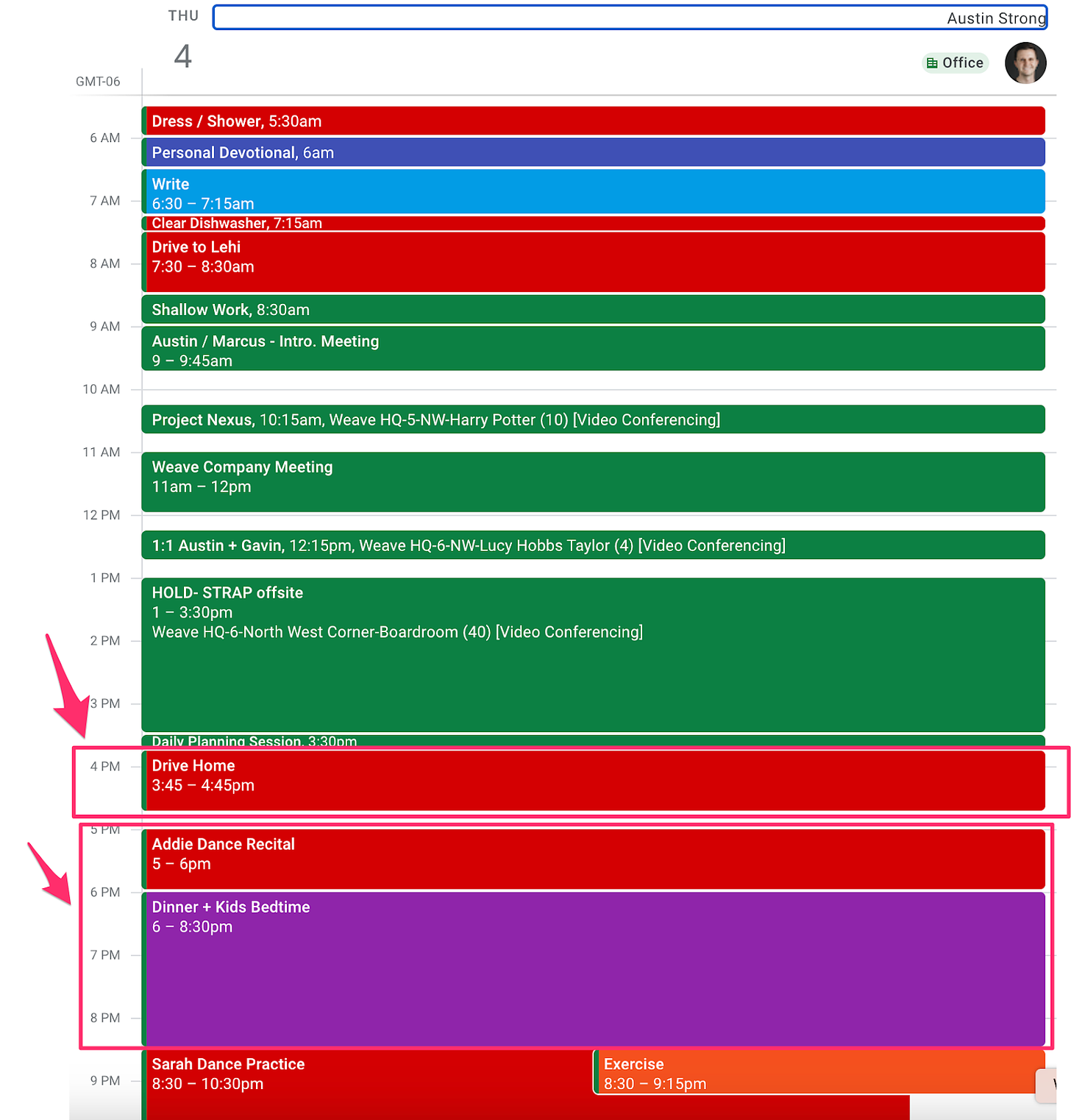A simple mind shift that can help you improve your relationship with your spouse
This was a hard article for me to write. Not because the topic is complicated, but because it’s a principle that I struggle to live up to consistently.
A few weeks ago my wife and I were having a good discussion on what our specific “love languages” were. In the middle of the conversation my wife said something that stood out:
“Honestly, one of the things that makes me feel the most love for you is the times when you show up exactly at 6 o’clock for dinner.”
That one caught my attention. Partly because I didn’t think of “being on time” as an obvious romantic gesture, but mostly because I knew it was one of my personal weaknesses.
I’m excellent at being on time for work. I’m almost always early or right on time. I’m one of those people who sets a timer on their phone 5 mins before every meeting just to ensure that I’m not late. Here’s literally a screenshot of my phone from this morning:

But in my personal life it’s a different story. I’m often trying to wrap up “that last email” before heading up for dinner (I work from home most days) or “sending one more slack message” before trying to get out the door to go somewhere with my family. I’m wired in a way where it’s hard for me to unwind from work if I know there is an outstanding task to be completed, especially one that is a small task that I could take care of quickly.
The problem is that those small tasks often end up delaying me by 5 to 15 minutes. So this usually means that I’m coming upstairs for our 6pm family dinner at 6:10 (or even 6:15pm). That may not seem like a big deal. But until my conversation with my wife I never realized that I was sending a problematic message to my family: “It’s really important for me to be on-time for things at work, but it’s okay if I’m late to things with you.”
I’m coming to realize that being to dinner by 6pm isn’t about whether the food is cold or even being just 5 minutes late. It’s about letting my wife and kids know that “you’re just as important to me as my career.” Until recently I hadn’t realized that I had unintentionally been signaling the opposite.

When I mentioned my “revelation” about the message my tardiness was having on my family to my wife, she explained that when you’re married to someone who is constantly late (due to work) you end up lowering your expectations of how much you can count of them in order to preserve a sense of control and protect yourself emotionally.
Michelle Obama famously told her husband before he became the US President that because of his extremely busy and unpredictable schedule, dinner time in the Obama home would always start at 6pm, with or without him there. Michelle said:
“When it came to the home-for-dinner dilemma, I installed new boundaries, ones that worked better for me and the girls. We made our schedule and stuck to it…We didn’t wait for Dad. It was his job to now catch up with us.”
– Michelle Obama (“Becoming”)
Setting Boundaries Around Your Priorities
Perhaps my favorite quote on the topic of “putting our family first” comes from Harvard Professor Clayton Christensen:
“Even when you know what your true priorities are, you’ll have to fight to uphold them in your own mind every day. For example: like many of you, I suspect, I’m naturally drawn to interesting problems and challenges. I can lose myself in one for hours; solving it will give me a short-term “high.” It would be easy for me to stay late at work noodling on one of those challenges, or to be stopped in the hallway to have an interesting conversation with a colleague, or to answer the phone and finding myself agreeing to work on something completely new and be genuinely excited by the prospect.
But I know that spending my time in this way is not consistent with my priorities. I’ve had to force myself to stay aligned to what matters most to me by setting hard stops, barriers, and boundaries in my life – such as leaving the office at six every day so there is daylight time to play catch with my son, or to take my daughter to a ballet lesson – to keep myself true to what I most value. If I didn’t do this, I know I would be tempted to measure my success that day by having solved a problem, rather than getting the time I love with my family. I have to be clear with myself that the long-term payoff of investing my resources in this sphere of my life will be far more profound. Work can bring you a sense of fulfillment – but it pales in comparison to the enduring happiness you can find in the intimate relationships that you cultivate with your family and close friends.
– Clayton Christensen (“How Will You Measure Your Life?”)
Setting these kinds of work/life boundaries is one of those things they don’t explicitly teach you in business school. And I’m learning it can be extremely difficult to figure out at times. But making an effort in the small things, even just showing up 5 minutes early to dinner like I would for a meeting with co-worker, can set you apart as a spouse/parent in the same way it makes you stand out as an employee.
A few tips that I’ve found to be helpful in doing this:
- Set a timer on your phone to leave for any personal/family events (I set mine for ~5 minutes in advance)
- Have a “shut it down” routine and give yourself permission to stop thinking about work. We need to be able to mentally say “I’ve done enough today, and now I can move on to other things.” You don’t want to be physically present but mentally absent (aka still noodling over that big project at work).
- Set your work email/slack/phone notifications to silent during “non-work hours”. You don’t want to constantly get pinged by co-workers when you’re putting your kids to bed. Besides, most of those “urgent requests” aren’t really that urgent.
- Block off time on your calendar to be with your family. Prevent simple things like meals, play-time with your kids, etc. from getting scheduled over with meetings. (If you take a look at my calendar below, I literally block family time slots as “busy” to prevent meetings or calls from encroaching on them)

These aren’t perfect solutions or systems (as evidenced by the fact that I’m still occasionally late to family events). But they do help. Especially if you’re someone like me who isn’t naturally gifted at separating work/life items.
In the long scheme of things, the 5 minutes you could spend “sending one last email” is far less valuable than the 5 minutes you could spend showing up early to signal to your family that they are the priority in your life.
It’s one reason I will now be setting my “end of day alarm” to end 10 minutes earlier.


